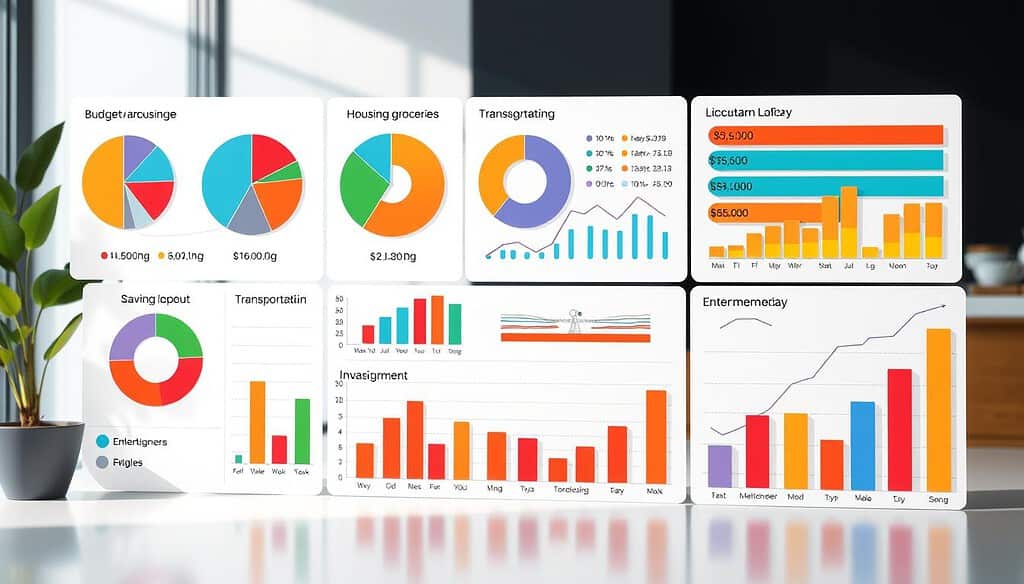As a mom who’s been there, I know managing money can feel hard. But, budgeting can actually help improve your credit score. I’m sharing 15 simple tips that helped me, and I think they can help you too.
Key Takeaways
- Budgeting is essential for both low and inconsistent income earners.
- Creating a spending plan can help you reach financial goals, pay off debt faster, and feel less guilty about spending.
- Budgeting tools like spreadsheets, apps, and even good old pen and paper can make the process easier.
- Automating savings and bill payments can help you stay on track with your budget.
- Regularly reviewing and adjusting your budget is crucial as your needs and expenses change over time.
Understanding the Connection Between Budgeting and Credit Score
Your credit score is very important for your money health. Budgeting helps improve it a lot. Knowing how budgeting and credit score are linked can help you make smart money choices.
What Makes Up Your Credit Score
Your credit score is based on several things. These include how you pay bills, how much credit you use, how long you’ve had credit, the types of credit you have, and how many times you’ve checked your credit. By managing these well with budgeting, you can make your credit score better.
How Budgeting Impacts Credit Repair
Budgeting helps you use your credit wisely. This is because 30% of your FICO score and 23% of your VantageScore come from it. Keeping your credit card balances low can really help your score. Budgeting also helps you pay on time, which is key for a good credit score.
Benefits of Smart Financial Planning
Good budgeting and planning have many benefits for your credit score and money health. Reducing debt, using credit wisely, and saving for emergencies are all important. They help you fix your credit and keep your finances stable for a long time.
| Benefit | Impact on Credit Score |
|---|---|
| Debt Reduction | Lowers credit utilization, improves payment history |
| Improved Credit Utilization | Accounts for 30% of FICO and 23% of VantageScore |
| Emergency Fund Establishment | Prevents missed payments and protects credit history |
Remember, budgeting is a continuous process. It’s important to check your money situation often because your income and expenses can change. By understanding the link between budgeting and credit score, you can take steps to improve your money health and reach your credit repair goals.
Essential Steps Before Creating Your Budget
Before you start making a budget for credit repair or debt repayment, know your money situation. Look at how much money you make each month. This includes your job, any side work, child support, or government help.
2. Track Your Spending
For a month or two, track where your money goes. Sort your spending into two groups. Essential costs are things like rent, bills, and food. Non-essential spending is for fun, like going out or eating at restaurants.
3. Prioritize Your Spending
Decide what’s most important to you. Put money towards things you need, like rent and bills. Also, save for emergencies and pay off debts. But don’t forget to enjoy some non-essential things too.
4. Choose a Budgeting Approach
There are many ways to budget. You might try the 50/30/20 rule or the zero-based budget. Pick the one that fits your life and money goals, whether it’s for debt repayment or credit rebuilding.
| Budgeting Approach | Description |
|---|---|
| 50/30/20 Budget | Use 50% for needs, 30% for wants, and 20% for savings and debt. |
| Zero-Based Budget | Every dollar goes to a specific expense, so your income and spending match. |

Creating a budget is hard work, but it’s key to managing your money. Stay committed, and you’ll get closer to a better financial future.
Budgeting Tips for Credit Repair
To get a good credit score, you need a solid plan. Start with a budget. This helps you manage money better and improve your credit score.
Creating a Realistic Spending Plan
First, make a budget that works for you. Split your money into needs and wants. Make sure to save for debt and emergencies too.
Check your budget often. This helps you find ways to save more for credit repair.
Setting Up Emergency Funds
Unexpected costs can hurt your credit score. Save 3-6 months’ worth of living expenses in an emergency fund. This way, you won’t need to use credit cards for emergencies.
Automating Bill Payments
On-time payments are key for a good credit score. Set up automatic payments for bills and rent. This keeps you from forgetting payments and helps your credit score.
Follow these budgeting tips to improve your credit score. Remember, it’s a long-term effort. Stay consistent to reach your goals.

Smart Strategies for Debt Management
Managing your debts is key to fixing your finances and credit. First, check out what debts you have and which ones cost the most. Then, make a plan to pay off these high-cost debts first.
The “snowball” method is a good way to start. Pay off the smallest debts first, while still making minimum payments on others. As you clear each debt, use that money to tackle the next one. This method builds momentum and shows progress fast.
The “avalanche” method focuses on the highest-interest debts first. It saves more on interest but takes longer to clear smaller debts. Pick the method that fits your goals and keeps you motivated.
2. Explore Debt Consolidation Options
Consolidating debts can simplify your payments and lower interest costs. Look into balance transfer credit cards or debt consolidation loans. These can make managing your debt easier.
Before consolidating, check the terms carefully. Make sure the new loan’s rate is better than what you’re paying now. Watch out for fees or charges that could add to your debt.
3. Utilize Credit Counseling Services
Struggling with debt? Credit counseling agencies can help. They offer advice on budgeting and debt management. They might even talk to creditors to lower your rates.
Choose a reputable credit counseling service. Look for one that’s accredited and has a good track record. Avoid companies with high fees or unrealistic promises.
4. Avoid High-Interest Alternatives
Stay away from high-interest loans like payday loans. They have very high rates and fees. This can lead to more debt and financial trouble.
Instead, use smart debt management strategies. Try negotiating with creditors or setting up payment plans. Avoid quick fixes to fix your credit and finances for good.

Building Positive Credit Habits Through Budgeting
Budgeting is a great way to build good credit habits and better your credit utilization ratio. Knowing your credit reports and scores helps you make smart money choices. Here are some key steps to start good credit habits through budgeting.
Maintaining Low Credit Utilization
Your credit score looks at how much credit you use versus what you have. Try to use less than 30% of your credit. Keep your credit card and other revolving account balances low.
Establishing Payment Reminders
On-time payments are key for good credit habits. Use reminders from your bank or a budget app to never miss a payment. Auto-pay can also keep you on track with bills.
Monitoring Credit Progress
Check your credit reports and scores often. This helps you see what’s working and what’s not. Use free services like Discover’s to watch for any credit changes or problems.
These steps make budgeting a strong tool for building good credit habits, improving your credit utilization ratio, and keeping an eye on your credit reports and scores. Stay consistent, and you’ll reach financial success.

| Credit Score Range | Credit Score Category |
|---|---|
| 800 – 850 | Excellent |
| 740 – 799 | Very Good |
| 670 – 739 | Good |
| 580 – 669 | Fair |
| 300 – 579 | Very Poor |
Conclusion
Budgeting is key to fixing your credit. It helps you manage your money better. This way, you can improve your credit score.
It’s not just about saving money. It’s about making good money habits. These habits help you in the future.
Want to budgeting tips for credit repair, credit score improvement, or financial planning for credit rebuilding? Stay on track with your budget. Check it often and make changes if needed.
Credit repair takes time. But with good budgeting, you’re on the right path. Stay patient and keep up with your money habits.
Together, we can make smart choices. These choices will help you financially for a long time.